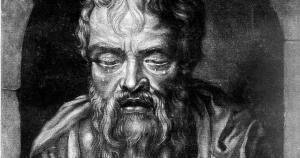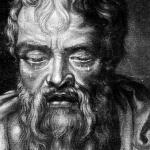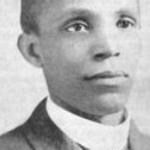232 You would not find out the boundaries of soul, even by travelling along every path: so deep a measure does it have.*
 Heraclitus of Ephesus, theist and curmudgeon (a common combination), knew that people are interesting. That’s easy: such an aphorism could fit on a Salada tag. He went further by saying why this is true: the soul, the ground of our being, is deep. Our souls are not infinite: we do contain much, but not everything. Still, any person’s soul, if they allow that soul to show, is so vast in interest, possibility, and promise that other humans (us!) will never be able to come to the end in a lifetime.
Heraclitus of Ephesus, theist and curmudgeon (a common combination), knew that people are interesting. That’s easy: such an aphorism could fit on a Salada tag. He went further by saying why this is true: the soul, the ground of our being, is deep. Our souls are not infinite: we do contain much, but not everything. Still, any person’s soul, if they allow that soul to show, is so vast in interest, possibility, and promise that other humans (us!) will never be able to come to the end in a lifetime.
If we know people and are bored, then the fault is likely our own.
Heraclitus lived in a culture that had been shaped by Homer. The great poet was fascinated by people, but mostly kings and heroes. His common man who dared speak, Thersites, was a coward and an ass. Most were doomed to die in the war of the better men, not interesting enough to merit a name. They had souls, but deplorably dull souls. Commoners are scenery in the Homeric play. Even the elite are types, driven by gods and by their own desires in predictable ways: even the great King Agamemnon also is tedious beyond belief. Achilles is driven by madness to his own ruin. Nobody in Homer, save perhaps Odysseus, is as interesting as the forces that make them.
The Trojan War is not about Trojans or the war, but about the gods and fate.
Against this Heraclitus was more consistent: he disliked everyone, commoners and elite alike. Heraclitus was a great egalitarian, treating every person like dogs. Ephesus returned the dislike by defaming his memory when he was gone. Heraclitus was not playing for public appeal! He attacked the gods of the city, the practices of the city, and was obscure even when he did not need to be.
Yet disliking a man is not the same as thinking one grasps him or that he has no value. There is an honor that Heraclitus gave to the poorest Ephesian by deeming him worthy of hatred. Heraclitus saw the (nearly) limitless soul, the connection (as he saw it) to the Divine Logos and holy fire, and then the foolish things humans did with that power. Heraclitus honored our humanity by disliking us: all of us.
The king, the shoemaker, the slave: we all were full of Logos and chose ugliness, depravity, and foolishness. We could worship the divine Logos and instead chose to praise Bacchus. In the midst of his misanthropist complaint about us, we might miss the improvement from Homer. Heraclitus elevated all of us by thinking us fit for a philosopher’s criticism. We could do better, we were not a faceless horde or a fate doomed hero.
Heraclitus gave us the courtesy of his disapproval. He was a forerunner to the Christ who knew every human was more interesting than the greatest book ever written. A great book is a mere icon of the soul: Heraclitus wanted to see our souls well formed.
We, all of us, have a vast deep within us: almost without limit. Knowing ourselves is almost too much for us, let alone knowing the Logos. We should, if the Logos ever revealed Himself, seek Him, but at least we might do as Heraclitus did:
246 I searched out myself.*
———————-
The Presocratic Philosophers, Kirk, Raven, Schofield.












